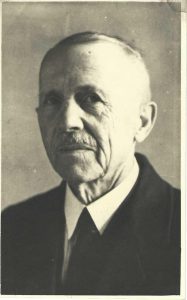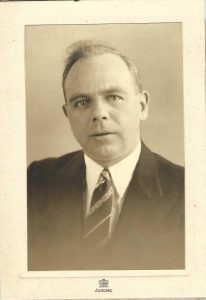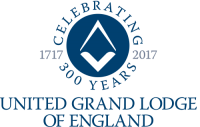Bro George Shyfler
During our research into the Lodge Temperance members who served in the First World War, the registers record two members with the words “alien enemy birth interned”. To try and understand this further our research looked at one of these members, Bro George Shyfler (his anglicised name).
Bro George was initiated into the mysteries and privileges of ancient Freemasonry on 21st April 1902, passed to the second or Fellowcraft degree on 20th May 1902 and raised to the sublime degree of a master mason on 19th June 1902. He was a 32 year old butcher living at 117, Beaumont Street, Elswick, Newcastle upon Tyne.
George was born on 23rd March 1870 in Lipfersberg, a village near Ingelfingen in the Hohenlohe area, a small agricultural based region in the north-eastern corner of Baden-Württemberg, Germany. His parents were Georg Martin Scheufler and Katharine Margarete Roth.
He emigrated to England in 1887 at the age of 17 years and the first record of him is in the census of 1891, aged 21, where he is living with widow Amelia Scheufler, a pork butcher from Kresberg, Germany, at 125-127 Church Street, Longbenton. Strangely the census shows George as Amelia’s son, which we know is not the case.
Amelia (Ernestina Emilia Feurer) married Christopher Sheifler in 1879 in Newcastle Upon Tyne and in 1881 they lived at 295 Westgate Road and Christopher is shown as a pork butcher from Lipfersberg in Germany. George was also from Lipfersberg, so it’s likely he was related to Christopher and was living with them when he arrived in England in 1887. Sadly, Christopher died in 1890 at the age of 38 years.
After Christopher’s death, Amelia continued the family business and is listed in the Kelly’s directory for Newcastle as Mrs. Amelia Schenfler, pork butcher, living at 125, Church Street, Walker. By this time George has his own shop and Kelly’s list Mr George Schenfler, pork butcher living at 71 City Road, Newcastle.
German pork butchers were a feature of the British high street from the early 19th century. Most of the first group of immigrants were professional pork butchers from the Hohenlohe region in the Kingdom of Wurttemberg. There were many reasons why so many came to Britain from this part of Germany and include population growth, agricultural depression, crop failures and the traditional inheritance practice of primogeniture which excluded all but one sibling from taking over the family land. Once established, however, they took full advantage of their prosperity and the growing opportunities for success in the fast-expanding cities of England’s north. Letters were posted home with the news that there was a good living to be made and many young sons of farmers were ready to take up the challenge. With their skills to make special products like German sausage, bath chaps (the lower part of a pig cheek), jellied brawn (jellied pigs head), rissoles (pork mashed up with potatoes and veg) or trotters, they met the demand with what were in effect the first takeaways, long before burgers, fish and chips and kebabs.
It was also common practice for letters to be posted home requesting young women for household duties and possible marriage which may explain how George met Katrina Truckenmuller born on 7th March 1870 from Buchenbach, Wurttemberg who he married on 2nd May 1893 in Newcastle Upon Tyne. They had four children of which three survived infancy:
- Catherine (b 1899 Newcastle – d 1899)
- Frederick (b 22/01/1901 Newcastle – d 1961)
- George (b 22/10/1902 Newcastle)
- Albert (b 27/04/1905 Newcastle – d 11/11/1980)
In 1901 George is a pork butcher at 32, Glue House Lane in Elswick, in 1902 at 117, Beaumont Street, Elswick and by 1910 has moved to 92, Benton Way, Wallsend where he remains for the next few years. Sadly, Katrina died in Wallsend on 7th August 1910 and George is shown as a widower in the April 1911 census but later that year on 25th October married Katrina’s younger sister Marie Truckenmüller born 20th April 1880 (her anglicised name was Mary Miller) , who had been recorded as the family’s domestic servant since the 1901 census. He also employed his wives’ brother Friedrich Truckenmüller of Buchenbach as slaughterer from 1894 onwards.
George and Mary had one son, Harold, born in 1913 in Wallsend.
After the outbreak of First World War and especially following the sinking of the Lusitania in May 1915, the situation of German pork butchers radically changed for the worse. Intolerance gripped the country and many became victims of widespread riots. Their premises were attacked causing extensive damage and the destruction not only affected property and goods, but coexistence too. In South Shields Market Place over the weekend of 15th May 1915 an estimated 6,000-7,000 people gathered. The windows of shops on the square were smashed, amid cries of “Remember the Lusitania” – a reference to the liner which had been torpedoed and sunk By Germany just a week before, with the loss of more than 1,100 lives. The rioters were eventually quelled by soldiers, but some broke off and roamed elsewhere. By the end of the night, the windows of pork butchers’ shops in Ocean Road and Mile End Road, among other places, had been smashed. At the subsequent court hearing, where nine men were bound over to keep the peace, they were told that their conduct had been “un-British” and they were reminded that all but one of the pork butchers were naturalised British subjects. Similar riots occurred in Newcastle, Byker and North Shields.
We don’t know if George’s shop was targeted but it’s doubtful that it escaped damage. Unfortunately, George and his wife had never taken the opportunity to become naturalised British subjects and George was arrested and interned at Knockaloe Camp, Isle of Man on 18th May 1915. He was transferred to Spalding Internment Camp in November 1917.
His wife, Mary continued with the family pork butchers at 92, Benton Way, Wallsend until at least 1916 and was then sent back to Germany with all four children for repatriation.
After the war many of those interned returned home or changed their names completely to avoid further problems and we know that George was repatriated to Künzelsau following his release after the war. He worked as a pork butcher again but his granddaughter, Helen, is not sure if he owned the business although he lived above the shop. Helen and her family visited just after the war when she was 5 years old and visited several times.
George and his wife Mary continued to live in Künzelsau, Germany where George died on 26th April 1959 and Mary on 7th May 1958. Frederick and Albert returned to England after the war but George and Harold remained in Künzelsau and married there. Harold died in 1943 in Russia during the war.
In 1939 Frederick was a hotel porter and went on to marry Katherine Zissler in Edmonton, London in 1943 and later returned to Newcastle where he died in 1961. Kathrine died in Edmonton in 1990.
Albert married Karolina Amerer in Middlesex in 1939 where he was a food shop assistant and died in Brentwood, Essex on 11th November 1980. Karolina died in 1966.
Many thanks to Alison Outterside, a Shyfler family descendant, for much of the information and for keeping me straight on the various spellings of the surname Sheifler, Sheiflar, Shyfler, Schenfler, Schaflar, Scheufler to name but a few.
Also many thanks to Helen, Albert Shyfler’s daughter, and her friend Wendy Craft for getting in touch and providing personal information and the photos of Bro George and Albert.
Page updated 02/05/2023
Become a Mason
Check out our FAQs





